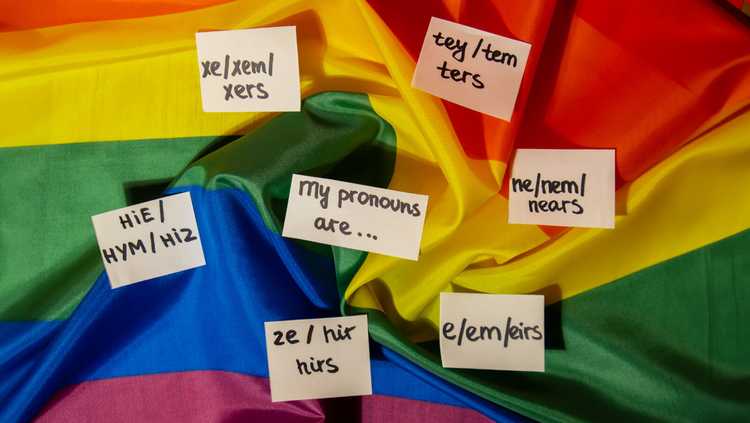Autotrader's LGBT+ Network is here to take a look at pronouns. What are they? Why are they important? Why do people specify them?
We're encouraged to bring our whole selves to work; for that to happen, we need all colleagues to feel safe and included. To foster inclusivity and show support for our LGBTQ+ colleagues, our network is leading an initiative to encourage everyone to share and display their pronouns.
Suppose (and only if!) someone is comfortable expressing their pronouns. In that case, this can be done online (via email signatures, Teams profiles, and Slack bios) and offline (via introductions or badges, for example).
If we're asking people to share and display them (and it's not just us – many courses and conferences ask for them as part of their sign-up processes), then it's worth taking a step back and defining what pronouns are and looking a little more deeply into why everyone's talking about them.
What are pronouns? Pronouns are words that refer to either people talking ("I" or "you") or someone or something that is being talked about (like "he", "she", "it", "them", and "this"). They are a quick way of referring to someone or something without naming or describing them every time.
We all use pronouns all the time without thinking about it. If we didn't, we'd end up with sentences like "Jacqueline spilt Jacqueline's coffee all over Jacqueline's laptop and broke Jacqueline's favourite mug". Using pronouns becomes much cleaner: "Jacqueline spilt her coffee..." or "I spilt my coffee..." If someone says that they use 'He/Him' pronouns, it indicates that those are the pronouns to be used when referring to him.
Why are they important? In the same way that we would make sure to name another person correctly, using their pronouns sends a clear sign that we are including them and paying attention to them.
Why are we sharing them? We often make assumptions about other people's gender based on their name or appearance. These assumptions aren't always correct - spare a thought for every Alex, Charlie, or Sam who has ever sent an email or any baby wearing green or yellow instead of pink or blue. By normalising the inclusion of pronouns as part of an introduction or an email signature, we can remove a source of potential awkwardness and distress.
What if I get someone's pronouns wrong? Apologise and move on. There's no need to make a big deal; that can be uncomfortable and awkward for all involved.
What if someone else gets someone's pronouns wrong? This one's a little trickier, as the person being misgendered (i.e. referred to using terms that apply to a gender other than their own) may not be out to the person misgendering them. Generally, follow the misgendered person's lead. A polite correction would be greatly appreciated if they've indicated that they'd like people to be corrected.
What does it mean when someone has multiple pronouns, such as She/They? This person is indicating that they are comfortable with any of the pronouns specified (it could be more than two: Queer Eye's Jonathan Van Ness uses She/He/They pronouns). Using any specified pronouns when referring to such a person is OK – feel free to mix and match as a conversation progresses!
What if I don't want to share my pronouns? Absolutely fine 😊 There are many reasons why someone might not want to share, and we don't want anyone to feel pressured to share them if they'd prefer not to.
What's a neopronoun? / What does Ze/Hir mean? 'He' and 'She' are inherently pretty gendered. While in English, we have the option of the singular 'they' as a pronoun, some languages (French or German, for example) don't have an ungendered pronoun in common usage. What, then, is a person who doesn't identify as male or female to do? Enter neopronouns, such as Ze (pronounced 'zee') and Hir (pronounced like 'here').
Hopefully, this post has helped you with the whats and the whys of pronouns and left you feeling more comfortable sharing them. Speaking personally, seeing other people sharing their pronouns makes me feel more comfortable sharing my identity and genuinely helps me feel safer and more secure at work. It's a simple step, but it makes a huge difference!

